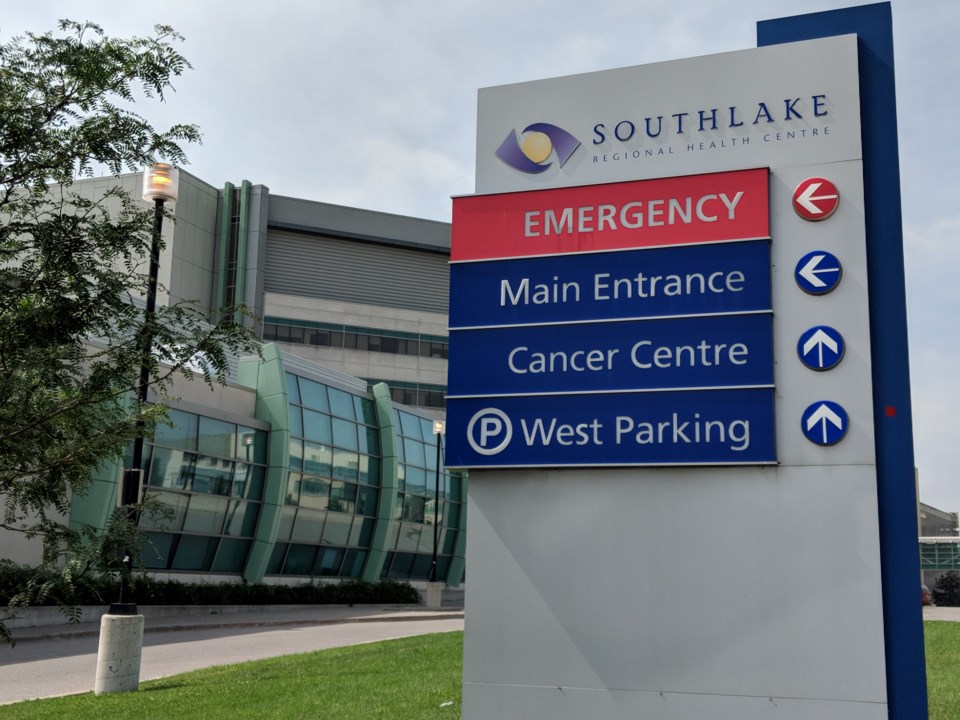Following complaints from a group of registered nurses at Southlake Regional Health Centre, an independent assessment committee is examining evidence regarding patient safety and staffing levels at the Newmarket hospital's medical assessment consultation unit, according to the Ontario Nurses Association.
"These patients have acute, complex care needs. Coupled with too few RNs to care for them, we believe there is an unhealthy work environment. These issues have been escalating for more than two years, without adequate solutions or regard for the nurses and staff, and especially for patients and their families," said ONA president Vicki McKenna in a statement.
The unit's registered nurses requested the hearing — which McKenna called "a last resort" — because they are concerned about the negative impact of understaffing to both nurses and patients in the unit.
The nurses have been "struggling for some time" with the requirement to care for more and more patients at a time, "which is very worrisome," she said.
The MACU is an acute, intensive in-patient unit for patients who don't require the ICU but have medically complex issues needing assessment and whose conditions can change instantly.
Southlake "welcomes the independent review process and are committed to continue to work together with our union partners to keep making improvements in the provision of quality patient care," said Kathryn Perrier, manager of corporate communications, in an email statement.
"Under the leadership of a new chief nursing executive and in strong partnership with Southlake’s executive vice-president of clinical operations and committed new leaders in this unit, we have collaborated with frontline nurses to develop a comprehensive plan to address the challenges. We are committed to this detailed plan, which we have already started to implement in partnership with nurses on the unit. The plan is introducing significant positive changes that were co-developed with active engagement and input from staff," said Perrier.
According to McKenna, "Southlake has failed to adequately address these issues and the RNs remain concerned, not only for the safety of their patients, but also about their ability to meet their professional standards due to insufficient RN staffing levels."
The nurses have voiced their concerns to frontline and middle managers and directors at the hospital and made suggestions for possible solutions. The nurses, she added, have been requesting Southlake post jobs and hire nurses for the unit.
"Our highly educated and skilled RNs have consistently provided written documentation to this employer, outlining the impact of inadequate RN staffing levels on their ability to provide safe, quality care for their patients," said McKenna.
During the hearing that convened Sept. 27, a panel of three nursing experts — one chosen by ONA, one by Southlake and a third impartial expert — will hear from the RNs and Southlake. The panel will review both verbal and documented evidence and make recommendations or come up with strategies so that a plan for resolution can be made.
The unit is not isolated in its problem with staffing shortage.
Prior to the pandemic, Ontario was already in the midst of a nursing shortage, with ONA reporting an average of 690 RNs per 100,000 Ontarians in 2018, but with the stress of working through the pandemic causing many nurses to leave the profession the shortage is even more dire now.
According to data from Statistics Canada in January 2021, the health care and social assistance sector experienced a higher vacancy rate than any other sector. ONA said the vacancy rate for nursing positions in Ontario is 18 to 22 per cent.
Southlake is one of the most overcrowded hospitals in Ontario and like other hospitals is facing staffing shortages, said Perrier.
The shortage is being felt everywhere, from hospitals to long-term care facilities, McKenna said, but it can't be used as an excuse.
"We can't just throw our hands up in the air and say 'shortage of nurses, we can't really do anything about it.' They have to recruit; they have to get out there."
She said that while Southlake may say it is trying to recruit nurses, it doesn't seem that the hospital is recruiting for the much-needed support staff required to assist the RNs in the MACU unit.
"There has to be a plan developed so the nurses and patients on these units see that there's work being done, that there's light at the end of the tunnel. We can't just say 'this is a bad situation so we can't do anything,' that's not true. We have to work together and develop a plan and the nurses believe Southlake hasn't been paying attention to what's going on and also acting in the best interest of the patients that they're trying to care for."
Nurses in the MACU unit want to continue to work there, but they're either leaving the hospital or moving to better-staffed units because of the conditions and because of that, McKenna said, staffing levels in the units are "dwindling."
This is not the first time Southlake RNs have voiced their concerns for patient safety. In July, RNs of the intensive care unit, cardiac intensive care unit, cardiovascular intensive care unit and registered respiratory therapists urged the hospital's board to take action to stop the hospital from implementing a plan to hire nurses to work in critical care units who lack the same critical care training as their colleagues.
The date for when the parties will receive the committee's recommendations is unknown.
